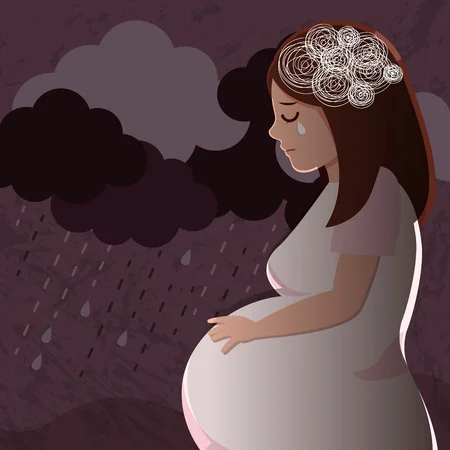Babies and their mother’s emotions are closely linked. Find out what happens to a baby when its mother cries during pregnancy. Stress can also affect the fetus and cause particular reactions.
Already during pregnancy, the fetus feels the emotions of the mother. If the latter often feels sad, the child perceives it. In fact, the fetus is not fully protected by the enzyme responsible for transforming cortisol, the stress hormone, into cortisone, an anti-inflammatory.

Stress has an impact on the development of the fetus
A study from the University of Zurich shows that stress affects the development of the fetus. In collaboration with the Max Planck Institute in Munich, the scientists investigated the relationship between stress and fetal metabolism.
Result: During pressure, the placenta secretes a hormone, corticoliberin, which influences the metabolism of the fetus.
On the contrary, when the latter is secreted in small amounts, it has a positive impact on the fetus by improving its growth and increasing its chances of survival. A double-edged sword in case of stress for moms, who are always up to the task even in case of exhaustion.
Anxiety and depression, threats to the fetus.
While crying on rare occasions does not threaten the fetus, intense stress and overly strong emotions can begin to compromise the mother’s mental health. Such symptoms may indicate an anxiety disorder or mild to severe depression. And this is not trivial for the baby because it can have a strong impact on the day of delivery.
This study shows that anxiety and depression increase the risk of preterm delivery or low birth weight. This study also attests that there is also a correlation between mental anguish and the risk of giving birth to a premature child. Scientific evidence that calls for taking care of yourself and listening to detect possible symptoms of depression.
What promotes depression?
If depression is first and foremost an illness, there are factors that can precipitate it in this period of hormonal turmoil. A diet low in nutrients and lack of physical activity promote feelings of discomfort and anxiety inherent in this mental illness. If you experience the symptoms of this pathology, such as sleep disturbances, loss of interest in pleasurable activities, fluctuations in food, it is imperative that you consult a specialist.
This disorder is not trivial and can even do 9 things to your body. Other symptoms characterize it if they last for at least two weeks, such as intense sadness, little interest in the pregnancy, but also incapacity in daily life. While the mother is pregnant, this is called prenatal depression.
Not taking care of yourself more is also a side effect of this psychiatric illness. There are medical treatments that do not harm the developing fetus and that can be administered by a specialist or general practitioner.
Prenatal depression: beware of the stigma!
Cultural and social mandates related to motherhood can add to the guilt associated with depression, which can be masked and exhibit 12 signs . Therefore, pregnant women are sometimes embarrassed to admit that they feel sad as they prepare to give birth.
However, it is important to diagnose natal depression early because this psychiatric disorder can be accompanied by suicidal thoughts and misbehavior.
That is why the environment of a pregnant woman must be attentive to the symptoms to accompany her in medical procedures. Certain elements can trigger prenatal depression, such as financial pressure related to childbirth, a history of depression, a history of miscarriages, or complications during pregnancy.
Therefore, it is important for a pregnant woman to be kind to herself and not hesitate to ask for help when a task is too difficult.
According to this research by Lisa de Noose, a doctor in clinical psychology, “pregnancy involves intense identity work during which the woman is born a mother.”
He explains that it already begins before conception but that the construction of a mother occurs during pregnancy and that many psychic changes are taking place at this time.
